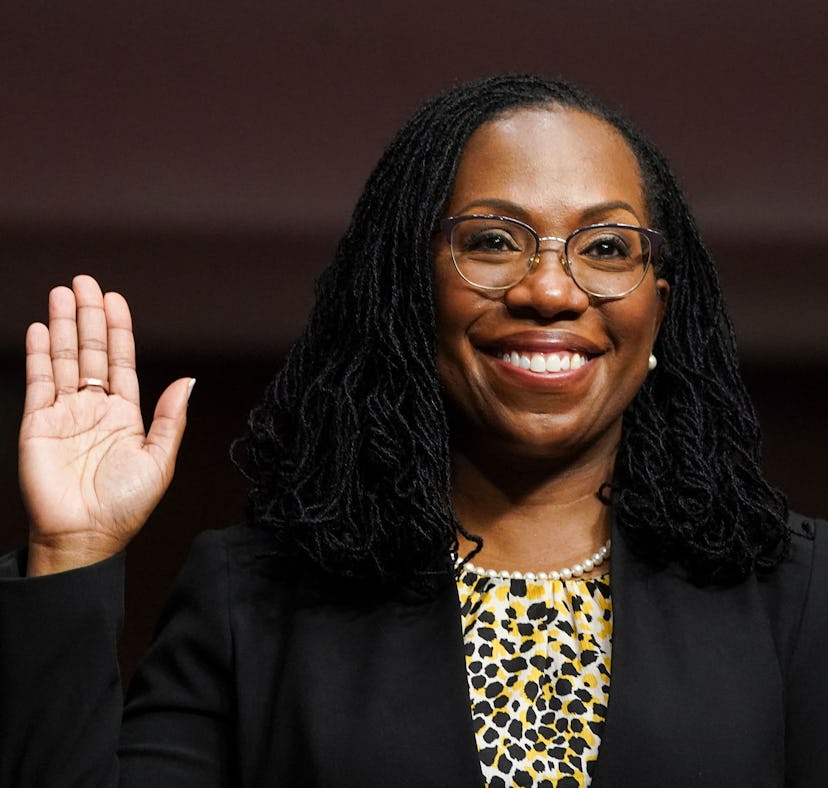
Ketanji Brown Jackson, The First Black Woman Nominated To SCOTUS, Is So Impressive
This resume is extensive.
It’s official: On Friday, Feb. 25, President Joe Biden nominated Judge Ketanji Brown Jackson to the Supreme Court. If confirmed, she’ll be the first Black woman to have a seat in the court’s 232-year history. It would also mark the first time two Black justices would serve alongside each other.
If confirmed, Jackson will replace justice Stephen Breyer, who revealed on Jan. 26 he’s planning on retiring in June after serving on the court for 27 years. A day after his announcement, Biden tweeted, “The person I nominate to replace Justice Breyer will be someone with extraordinary qualifications. Character, experience, and integrity. And they will be the first Black woman nominated to the United States Supreme Court.”
Biden first made the promise to nominate a Black woman to the Supreme Court while speaking at a Democratic debate during his 2020 presidential campaign. Now, two years later, Breyer’s retirement has finally given Biden the opportunity to make good on his promise.
The day Biden announced his nomination, the White House released a statement revealing the president chose Jackson because she’s “wise, pragmatic, and has a deep understanding of the Constitution as an enduring charter of liberty.” The White House added, “The president sought an individual who is committed to equal justice under the law and who understands the profound impact that the supreme court’s decisions have on the lives of the American people.”
Here’s what you should know about Jackson’s background and education that led her to her historic Supreme Court nomination.
01She’s Got The Experience
Currently, Jackson serves on the United States Court of Appeals for the D.C. Circuit, which she joined in 2021. Before that, Jackson was a district judge on the United States District Court for the District of Columbia, starting in 2013. She was also a vice-chair and commissioner of the United States Sentencing Commission from 2010 to 2014, during the presidency of Barack Obama.
Before her stint on the various benches, according to her Court of Appeals bio, Jackson was also a trial lawyer, an assistant federal public defender for the District of Columbia, and — yes, a Supreme Court clerk. Fittingly enough, she clerked for Justice Stephen Breyer, who she’s now been tapped to replace.
02Her Education Background Is Super Impressive
In speeches, Jackson has revealed she was inspired to pursue a career in law thanks to her father. “Some of my earliest memories are of him sitting at the kitchen table, reading his law books,” she said in a speech as President Joe Biden announced her nomination to the Supreme Court. “I watched him study, and he became my first professional role model.”
According to her White House bio, Jackson knew she wanted to attend Harvard University in order to pursue law — despite her high school guidance counselor believing she shouldn’t set her “sights so high.” Jackson went on to graduate magna cum laude from Harvard University in 1992 and even worked as a reporter for Time magazine. She then attended Harvard Law School, where she was an editor of the Harvard Law Review. Jackson graduated cum laude in 1996.
03She’s Weighed In On Some Major Cases
Through the years, Jackson has ruled in a number of high-profile cases, including in 2019 when she declared that Donald Trump’s first White House counsel Don McGahn must cooperate with Congress’ investigation into Russia’s possible interference in the 2016 presidential election. According to Business Insider, Jackson issued a 118-page ruling criticizing the Trump administration for arguing that McGahn didn’t have to testify. In her report, she said "presidents are not kings" and that "no one is above the law."
"However busy or essential a presidential aide might be, and whatever their proximity to sensitive domestic and national-security projects, the president does not have the power to excuse him or her from taking an action that the law requires,” Jackson wrote in her ruling.
04She Would Be The First Black Woman On The Supreme Court
And yep — Jackson’s confirmation to the Supreme Court would be historic, as the first Black woman nominated to the highest court.
She would not only be the first Black woman to have a seat but the third Black justice overall following Thurgood Marshall’s appointment in 1967 and Clarence Thomas’ in 1991. She would also be the sixth female justice in the court’s history. Sandra Day O'Connor was the first woman to join the Supreme Court in 1981, followed by Ruth Bader Ginsburg in 1993, Sonia Sotomayor in 2009, Elena Kagan in 2010, and Amy Coney Barrett in 2020.
Jackson has already made history with her Supreme Court nomination, and she could do it once more if she’s officially appointed on the bench. Still, her confirmation process is sure to be a fight. Senate leaders hope to hold a vote on her confirmation in mid-April, per CNN.